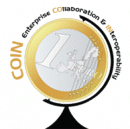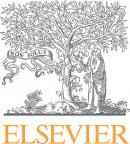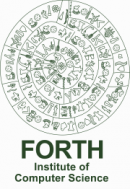Steering Committee
Chair:
John Domingue, KMI, The Open University, UK & STI International, AT
Members:
Lora Aroyo, VU University of Amsterdam, NL
Sean Bechhofer, University of Manchester School of Computer Science, UK
Fabio Ciravegna, University of Sheffield, UK
Enrico Franconi, KRDB Research Centre, Free University of Bozen-Bolzano, IT
Eero Hyvönen, Aalto University, FI
Michael Kifer, State University of New York at Stony Brook, USA
Paolo Traverso, FBK, Center for Information Technology - IRST, IT
Next Meeting
The next meeting of the ESWC Steering Committee and ESWC Organisation will take place at this year's ESWC on Tuesday, 31st May 2011 at 15:00 - 18:00.
Brought to you by

Platinum Sponsors
Best Paper Award Sponsor
Gold Sponsors
-
 COIN
COIN The mission of the Coin IP is to study, design, develop and prototype an open, self-adaptive, generic ICT integrated solution to support the above 2020 vision, starting from notable existing research results in the field of Enterprise Interoperability and Enterprise Collaboration.
-
 Elsevier
Elsevier Elsevier is the world's leading provider of scientific, technical and medical (STM) information, tools and resources. A global company based in Amsterdam, Elsevier partners with scientists, researchers, healthcare providers, educators and decision-makers in academic institutions, governments and corporations to help them find, evaluate and use information. Our breadth of content is unparalleled, spanning virtually every STM field in the world. Using innovative technology, we deliver our content through tools that help our customers be more productive and successful in their work. ScienceDirect our premium online portal delivers the worlds' leading journals electronically to over 11 million readers in 200 countries. Elsevier is looking at how in the contemporary scientific environment we can meet the real challenge to provide efficient access: eliminating research obstacles by creating a new kind of knowledge ecosystem that is integrated, intelligent, trustworthy and open to innovative applications.
-
 FORTH
FORTH Since its establishment in 1983, the Institute of Computer Science at FORTH has had a relatively long history and recognized tradition in conducting basic and applied research, developing applications and products, providing services, and playing a leading role in Greece and internationally, in the fields of Information and Communication Technologies. It is the top rated research institute in Greece in the area of ICT, and represents Greece within the ERCIM network of European ICT institutes. Its Information Systems Laboratory combines expertise in knowledge representation and reasoning, database systems, web-based information systems and conceptual modelling, and is one of the leading research groups in the area of the semantic web.
-
 Hellenic Artificial Intelligence Society (EETN)
Hellenic Artificial Intelligence Society (EETN) Founded in 1988, the Hellenic Artificial Intelligence Society (EETN) is a non profit scientific organization devoted to organizing and promoting AI (Artificial Intelligence) research in Greece and abroad. Since its establishment, EETN has participated in the organization of various national and international events related to AI and its subfields. EETN is also interested in promoting AI in higher education and in exploiting AI research results by commercial organizations. The recent, rapid growth of the Internet and the World Wide Web has intensified the need for intelligent information systems and increased commercial interest in the area of AI.
Since 1996, EETN is a member of the European Coordinating Committee for Artificial Intelligence (ECCAI), whose international prestige is similar to the one of the Association for the Advancement of Artificial Intelligence (AAAI). EETN's participation in ECCAI, as an equal society member, as well as the organization of EETN conferences (SETN), workshops and summer schools has significantly upgraded its role.
-
 INSEMTIVES
INSEMTIVES INSEMTIVES combines research with development and real-world applications. The foundations are methods and guidelines facilitating semantic content creation in an incentives-driven manner. They underly the INSEMTIVES platform (back-end) and various end-user tools for semantic content creation (front-end).These technology components are used in three case studies targeting the management of enterprise content, the annotation of Web service artifacts, and the management of multimedia in online worlds and games.
-
 IOS Press
IOS Press IOS Press - (co-)publishes around 100 international journals, ranging from computer science and mathematics to medicine and the natural sciences and 100-125 book titles a year. 2010 sees the launch of the new journal Semantic Web. Commencing its publishing activities in 1987, IOS Press services a variety of scientific and medical communities in all parts of the world. IOS Press is a fast growing publishing company, which follows the developments in publishing closely. All journals are available online and an online book platform was launched in 2006.
-
 LarKC
LarKC The aim of the EU FP 7 Large-Scale Integrating Project LarKC is to develop the Large Knowledge Collider (LarKC, for short, pronounced “lark”), a platform for massive distributed incomplete reasoning that will remove the scalability barriers of currently existing reasoning systems for the Semantic Web.
-
 LOD2
LOD2 The outputs of this project will range from sci-tech to socio-economic areas by providing new technologies and an underlying scientific basis for these and by applying these new technologies to a number of Semantic Web areas experiencing commercial (enterprise search, media and publishing), scientific (extraction, interlinking, ontology classification and fusion methods), and sociological (community knowledge, integration in social networks, eGovernment) success at present. The project aims to contribute high-quality interlinked versions of public Semantic Web data sets, promoting their use in new cross-domain applications by developers across the globe. The new technologies for enabling scalable management of Linked Data collections in the many billions of triples will raise the state of the art of Semantic Web data management, both commercial and open-source, providing opportunities for new products and spin-offs, and make RDF a viable choice for organizations worldwide as a premier data management format.
The algorithms and (open-source) tools that the project will develop for data cleaning, linking and fusing will help creating and bootstrapping new data sets in domains that go much beyond the direct applications and data sets developed in the context of this project, to reach the overall goal of the project of making Linked Data the model of choice for next-generation IT systems and applications. -
 Ontotext
Ontotext Ontotext is the developer of several outstanding products and major contributor to open-source platforms. It is a proven, competent and cost-effective, partner in:
- Development of tools and solutions based on semantic technologies
- Software engineering, performance optimization, ontology design
- Analysis, evaluation, feasibility studies based on cutting-edge expertise
The technology delivers real-world applications in Web Services and Enterprise Application Integration, Knowledge Management and Textmining, Business Intelligence, Media Research, and Life sciences. Ontotext carries out research in: NLP, information retrieval, ontology design and management, knowledge representation and reasoning, semantic web services and business process management (BPM). It is taking part in research projects with total budget of more than 100 million EURO. As a member of W3C we are involved in the development of the vision and the standards powering the development of the web.
-
 Pascal2
Pascal2 Pascal 2 The PASCAL Network of Excellence has created a distributed institute pioneering principled methods of pattern analysis, statistical modeling, and computational learning as core enabling technologies for multimodal interfaces that are capable of natural and seamless interaction with and among individual human users. The resulting expertise has been applied to problems relevant to both multi-modal interfaces and cognitive systems. PASCAL2 will enable a refocusing of the Institute towards the emerging challenges created by the ever expanding applications of adaptive systems technology and their central role in the development of large scale cognitive systems. Furthermore, the funding will enable the Institute to engage in technology transfer through an Industrial Club to effect rapid deployment of the developed technologies into a wide variety of applications, while undertaking a brokerage of expertise and public outreach programme to communicate the value and relevance of the achieved results.
-
 PlanetData
PlanetData The PlanetData project is built around three objectives that together ensure the creation of a durable community made up of academic and industrial partners. This community will be supported in conducting research in the large-scale data management area through the provision of data sets and access to tailored data management technology. It will benefit from a comprehensive program of training, dissemination, standardization, and networking activities, intended to strengthen existing collaborations and establish new ones, to educate organizations in key questions related to open data exposure, and to transfer research results towards industry.
-
 Talis
Talis The Talis Platform is an open technology platform for mass collaboration and human-centric and information-rich applications. A platform for semantic applications, it combines Semantic Web, information retrieval, collective intelligence and behavioral mining technologies. Provides data management, organization and analysis components that can learn and understand patterns of behavior and present them through an API to be interwoven appropriately into any application. Interaction with the Talis Platform is via a suite of RESTful Web services.
-
 VideoLectures.NET
VideoLectures.NET VideoLectures.NET is a free and open access educational video lectures repository. The lectures are given by distinguished scholars and scientists at the most important and prominent events like conferences, summer schools, workshops and science promotional events from many fields of Science. The portal is aimed at promoting science, exchanging ideas and fostering knowledge sharing by providing high quality didactic contents not only to the scientific community but also to the general public. All lectures, accompanying documents, information and links are systematically selected and classified through the editorial process taking into account also users' comments.